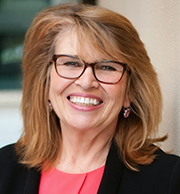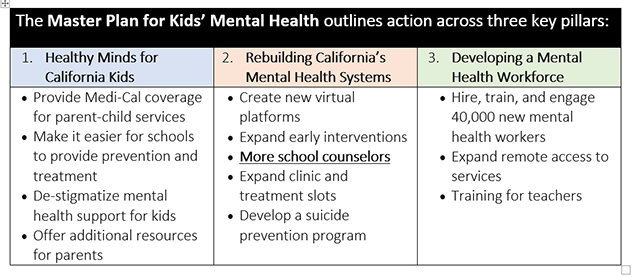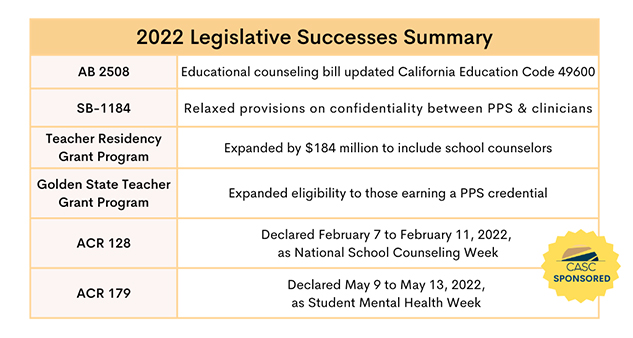
AB 2508 - A Game Changer for California School Counselors
By Loretta Whitson, Ed.D. | November 2022
 Out of the 997 bills Governor Newsom signed this year, why was the CASC-sponsored bill AB 2508 (Quirk-Silva) one of the handful signed in a rare public signing ceremony? Let’s explore some of the reasons why, and make sure this moment receives the fanfare it deserves. Let’s also use AB 2508 as a public declaration to the work school counselors do and as a call to lower ratios.
Out of the 997 bills Governor Newsom signed this year, why was the CASC-sponsored bill AB 2508 (Quirk-Silva) one of the handful signed in a rare public signing ceremony? Let’s explore some of the reasons why, and make sure this moment receives the fanfare it deserves. Let’s also use AB 2508 as a public declaration to the work school counselors do and as a call to lower ratios.School counselors, for the first time, are a part of the Governor’s strategic plan (see table below). Why? One possibility is that CASC has been relentless in our advocacy efforts to increase the number of school counselors in California (speaking at legislative hearings, research, professional publications and briefs, news/media interviews, solidify key relationships with state decision makers). The second likelihood is that CASC capitalized on a perfect storm (Covid-19, school closures, increases in student mental health needs, and the approval of 2020 CTC Standards). Most likely it is a combination of many factors.

AB 2508 fundamentally and dramatically updates the ed code (CA Education Code (CEC) 49600) that authorizes the work of school counselors. The link above shows the final language passed; however, the introduction phase shows exactly the changes in the language from its introduction in February 2022.
Previous CEC 49600:
- The governing board of a school district may provide a comprehensive educational counseling program for all pupils enrolled in the school district.
- The governing board of a school district may, and is urged to, provide access to a comprehensive educational counseling program for all pupils enrolled in the school district.
New multitiered systems of support (MTSS) language reads: Work within multi-tiered systems of support that use multiple data sources to monitor and improve pupil behavior, attendance, engagement, and achievement.” There is a two-fold benefit to this statement: First, it outlines school counselors’ role in MTSS, and second, it delineates for the first time the link between school counselors and data within a tiered process.
The most fundamental change in CEC 49600 is the addition of mental and behavioral health language. California appears to be the first state to include in law the words “mental health” correlated to the work of school counselors. The rationale for including this language was fundamental and deliberate. First, the 2020 CTC Standards added mental health services into the standards. Second, CASC completed the best practice guidelines document in 2019, underscoring mental health as part of a nine-point best-practice strategy. Third, mental health language is a response to changing times. Twenty years ago, Social and Emotional Learning (SEL) was a term used almost exclusively by school counselors. As times changed, SEL expanded as a responsibility of all K–12 educators. Even with rising student mental health concerns, we noticed an uptick in school counselors being referred to as “academic counselors.” To make matters worse, licensed mental health professionals claimed that they were superior and if district had to choose, they should choose licensed providers because “they could do it all.” This reckless rhetoric has been with us for a long time; however, the stakes became higher because there was a large pot money available and industry leaders were jockeying for their part of those funds. As a side note, the school psychologists and the school social workers aligned as a united front, decisively deciding to stand in solidarity with a pro-PPS position. Last, as we know, individual and group counseling is a form of mental and behavioral health support, and now statute supports this unambiguously. For far too long, we, as a profession, have shied away from claiming our role in mental health. In 2021, CASC and ASCA leaders met on this matter and the urgency we felt to market the school counseling image as including mental health. The Assembly Committee on Education provided a review of AB 2508 that goes in depth as to the importance of AB 2508.
In conclusion, I recently received an email from Long Beach Unified School District (LBUSD) school counselor Kennedy Dixon. In October, LBUSD convened a panel discussion, “Reimaging School Counseling.” LBUSD school counselors have undergone substantive changes in the past few years, led by a grassroots advocacy effort that resulted in stronger representation, with school counselors voting to join the California Teachers Association and align their work with the ASCA National Model. Kennedy sees the vital connection of the passage of AB 2508 and the work in LBUSD, writing, “I truly believe that AB 2508 is going to be a game changer in school counseling in California, which was made possible by you and the CASC team.” Thank you, Kennedy, and I agree with you wholeheartedly.
CASC advocates to enact laws that strengthen and protect K–12 students and the rights of school counselors so that you are able to provide school counseling services in the most ideal conditions possible. We had a few victories, thanks in large part to all of your activism over the years.

Contact Loretta Whitson, Ed.D., CASC executive director, at executivedirector@schoolcounselor-ca.org.